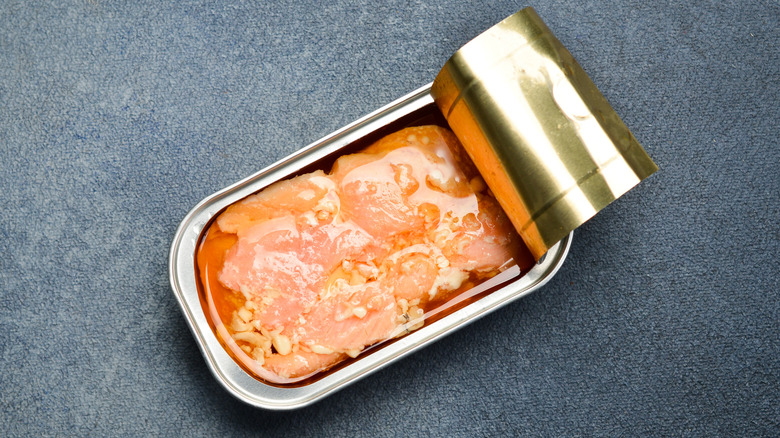Nearly 60 Million Cans Of Salmon Were Once Recalled Due To Faulty Equipment In Alaska
We recommend always keeping a can of salmon in your pantry, as you can't go wrong with this versatile and nutritious food. We also love the stability of canned foods, but keep in mind that the safety of canned salmon is only as reliable as the process used to manufacture it. An incident that occurred in 1982 is the perfect example of what can go wrong when there are problems with the fish canning process, as defects in cans of salmon resulted in a massive recall of almost 60 million cans and caused one person's death.
The issue was traced back to multiple salmon canning facilities across Alaska, and the subsequent investigation found that a malfunctioning piece of machinery was creating punctures and other types of defects in the canned salmon being produced, which resulted in the growth of bacteria. A Belgian man who ate the affected salmon succumbed to the effects of botulism, a type of food-borne illness capable of causing paralysis of the muscles, breathing issues, and loss of life. While the man's wife also grew sick after eating Alaskan salmon, she presumably recovered, and no other illnesses were reported. What resulted from the incident was a massive effort from the salmon industry to eliminate defective cans and upgrade quality measures to prevent future mishaps.
What happens during the salmon canning process?
While the exact technique will vary from company to company, virtually all canned salmon brands use a similar process when preparing their fish. First, the salmon is prepped via filleting, skinning, and slicing, at which point the meat is deposited into cans and sent to seaming machines, where the lids are attached. From there, the cans are sent to a pressure cooker and heated for a specific amount of time and to a certain temperature to ensure the meat is fully cooked. This heating process eliminates harmful bacteria and ensures that the canned salmon is a ready-to-eat product.
With so many steps and so many types of machinery involved, canning equipment malfunctions like the one that occurred in 1982 are often hard to anticipate and even harder to prevent. Problems with commercial canning equipment have affected other types of fish, as illustrated by our list of the biggest tuna recalls in U.S. history. Major brands like Bumble Bee and Tri-Union Seafoods are no strangers to equipment malfunctions that can increase the risk of bacterial growth within products. Consumers must be proactive about food recalls, but knowing which brands offer the highest quality is also helpful. That's why we compiled a ranking of canned salmon brands from worst to best to guide your shopping decisions the next time you get a craving for this tasty tinned fish.

